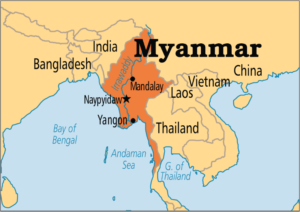SEPTEMBER 10- TODAY’S READING FROM THE ONE YEAR BIBLE- ISAIAH 6:1-7:25; 2 CORINTHIANS 11:16-33; PSALM 54:1-7; PROVERBS 23:1-3
TODAY’S READING FROM THE OLD TESTAMENT- ISAIAH 6:1-7:25
Chapter 6 describes how Isaiah is commissioned to his prophetic office.
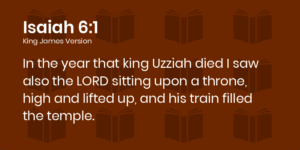 When King Uzziah dies in 740 BC, Judah lost a great leader. His vacancy on the throne was widely felt. Some consider Uzziah the last great king of the southern kingdom. He ruled for 52 years and successfully brought the Philistines, Arabians, and Ammonites into subjection. He was able to put the immediate threat of foreign invasion at bay. The nation prospered under his rule. It was thought that the glory of Israel had died with Uzziah. Jotham and his son Ahaz would inherit the throne of Judah.
When King Uzziah dies in 740 BC, Judah lost a great leader. His vacancy on the throne was widely felt. Some consider Uzziah the last great king of the southern kingdom. He ruled for 52 years and successfully brought the Philistines, Arabians, and Ammonites into subjection. He was able to put the immediate threat of foreign invasion at bay. The nation prospered under his rule. It was thought that the glory of Israel had died with Uzziah. Jotham and his son Ahaz would inherit the throne of Judah.
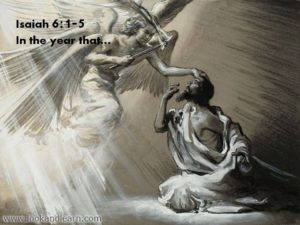 It is in this year of a leadership crisis, the year of King Uzziah’s death, that Isaiah sees that God has not abandoned His throne. In a vision, Isaiah’s eyes are lifted to a greater throne room where He is worshiped in a greater temple. The One who sits on the Throne is the Christ. In the New Testament Gospel of John, we learn that the glorious One who sits on the Throne seen by Isaiah is Jesus (John 12:38-43).
It is in this year of a leadership crisis, the year of King Uzziah’s death, that Isaiah sees that God has not abandoned His throne. In a vision, Isaiah’s eyes are lifted to a greater throne room where He is worshiped in a greater temple. The One who sits on the Throne is the Christ. In the New Testament Gospel of John, we learn that the glorious One who sits on the Throne seen by Isaiah is Jesus (John 12:38-43).
This King is so great that no temple can contain Him. Just the train (or hem) of His robe fills the temple! Isaiah, who most likely had been bemoaning the loss of Uzziah’s leadership, and possibly personal bereavement of his friendship, is reminded that the True King of the nation is not dead!
We need a fresh vision of the One who is truly on the throne. Do we truly recognize His greatness, His wisdom, His might, His righteousness, and His personal concern for every detail of our lives? We need to ask ourselves, “In whom are we putting our confidence?”
Hebrews 4:16 16 Therefore let us draw near with confidence to the throne of grace, so that we may receive mercy and find grace to help in time of need.
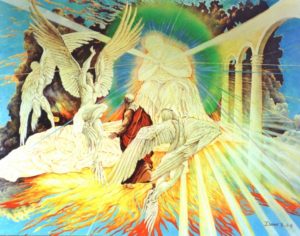 Isaiah makes another discovery. Not only is God on the throne, and exceedingly great (His train filling the temple), but He is altogether holy and will not compromise with sin.
Isaiah makes another discovery. Not only is God on the throne, and exceedingly great (His train filling the temple), but He is altogether holy and will not compromise with sin.
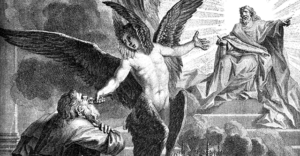 Heavenly beings called ‘seraphim’; surround the throne. It is only in this chapter in the Bible that these particular angels are named. The Hebrew root of the word ‘seraphim’ means ‘to burn’. The verb ‘to burn’ is used in conjunction with the sin offerings in the Old Testament and are associated with judgment. The root of the word ‘seraph’ is never used in relationship to the sweet-smelling offerings that speak of Christ representing us as righteous. The seraphim search out and apply the sin-purging aspects of the atonement. They are ‘burners’. They apply the positive condemnation of the cross upon the flesh and burn away sin. We have seen that cherubim are protectors of God’s holiness, guarding the gates of Eden, the place of fellowship with God. The seraphim are ‘purgers’. Together the cherubim and seraphim make up’ the living creatures’ spoken of in Ezekiel (Ezekiel 1:1-28) and the Book of Revelation (Revelation 4:8) and are pictured on the veil that separates the holy place from the holiest of all.
Heavenly beings called ‘seraphim’; surround the throne. It is only in this chapter in the Bible that these particular angels are named. The Hebrew root of the word ‘seraphim’ means ‘to burn’. The verb ‘to burn’ is used in conjunction with the sin offerings in the Old Testament and are associated with judgment. The root of the word ‘seraph’ is never used in relationship to the sweet-smelling offerings that speak of Christ representing us as righteous. The seraphim search out and apply the sin-purging aspects of the atonement. They are ‘burners’. They apply the positive condemnation of the cross upon the flesh and burn away sin. We have seen that cherubim are protectors of God’s holiness, guarding the gates of Eden, the place of fellowship with God. The seraphim are ‘purgers’. Together the cherubim and seraphim make up’ the living creatures’ spoken of in Ezekiel (Ezekiel 1:1-28) and the Book of Revelation (Revelation 4:8) and are pictured on the veil that separates the holy place from the holiest of all.
Fellowship with the Father is off bounds to the sinner. But Jesus’ death on the cross will remove the veil that separates. It will render the judgment of death to the corrupted nature of the old man, Adam, and provide the way into God’s presence through the Life of Jesus Christ.
John 14:6 6 Jesus *said to him, “I am the way, and the truth, and the life; no one comes to the Father but through Me.
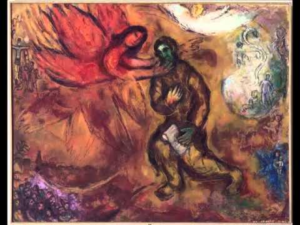 The six-winged seraphim call to one another antiphonally, honoring the thrice-holy Triune God with the words: “Holy, Holy Holy”.
The six-winged seraphim call to one another antiphonally, honoring the thrice-holy Triune God with the words: “Holy, Holy Holy”.
The triple accolades are to give unparalleled emphasis as well as reference to the three persons of the Trinity.
The vision of God’s holiness humbles Isaiah to dust. He is able to understand the spoken words of the seraphim, as their powerful voices cause the posts and thresholds of the temple to tremble.
Isaiah cries out, “Woe is me! I am ruined (NASB), undone (KJV), lost (ESV)”. “For my eyes have seen the King!” When Isaiah sees God, he sees himself. He sees that he is utterly unfit to be in God’s presence. This is a picture of the Holy Spirit bringing personal conviction of sin (John 16:8-11).
In the light of God’s holiness, Isaiah recognizes his true condition before God as a man of unclean lips living among people of unclean lips. This humbling self-knowledge is essential if anyone is to rightly lay hold of God’s mercies. A similar response is found in others who get a glimpse of God’s majesty in the Bible. Remember the self-abasement of Job after God makes Himself known (Job 42:5-6), or Daniel when he sees the Lord in His glory, and his own’ comeliness turns to corruption’ (Dan 10:8 KJV). Remember Peter when he witnesses Jesus’ miraculous catch (Luke 5:8) and cries ‘Depart from me, I am a sinner!’, or the Apostle John on the island of Patmos when he turns to the voice speaking to him and sees the Lord. He falls at His feet as a dead man (Revelation 1:17).
In Chapter 5, Isaiah pronounced a string of six ‘woes’ upon the people. Now in Chapter 6, he laments his own uncleanness with ‘Woe is me!’. (Oi veh!) This self-recognition prepares him for ministry.
 One of the seraphim applies to Isaiah’s mouth a live coal from the altar of the temple where the sin offering has been made, announcing good news: “Your guilt is taken away and your sin is atoned for”. This is a picture of how the message of grace is received by faith with personal impact.
One of the seraphim applies to Isaiah’s mouth a live coal from the altar of the temple where the sin offering has been made, announcing good news: “Your guilt is taken away and your sin is atoned for”. This is a picture of how the message of grace is received by faith with personal impact.
The burning live coal is ‘the word of the cross’. It symbolizes the communication of the full benefits of the atoning work of Jesus Christ’s death on the cross.
1 Corinthians 1:18 18 For the word of the cross is foolishness to those who are perishing, but to us who are being saved it is the power of God.
Romans 10:8b “THE WORD IS NEAR YOU, IN YOUR MOUTH AND IN YOUR HEART”—that is, the word of faith which we are preaching,
 Isaiah is cleansed and now witnesses that the One who sits on the throne has greater concerns than that which occupy the minds of men. The One Who sits of the Throne of God has greater knowledge than those who sit on the thrones of men. Isaiah hears the Lord’s concern to have His mind communicated to men and His redemptive purposes advanced. He asks, “Whom shall I send?”
Isaiah is cleansed and now witnesses that the One who sits on the throne has greater concerns than that which occupy the minds of men. The One Who sits of the Throne of God has greater knowledge than those who sit on the thrones of men. Isaiah hears the Lord’s concern to have His mind communicated to men and His redemptive purposes advanced. He asks, “Whom shall I send?”
 Isaiah answers with reckless abandonment. “I will go wherever, whenever, however. Here am I.”
Isaiah answers with reckless abandonment. “I will go wherever, whenever, however. Here am I.”
As with the other prophets, such as Ezekiel and Jeremiah, Isaiah’s ministry would be exceedingly difficult.
The Lord commissions Isaiah to preach a message to people who will, for the most part, not receive it. The ministry of the Word will prove that the people of Judah are ‘not understanding,’ ‘not perceiving,’ ‘dull’ and ‘callous of heart’ (6:9-10).
How long is Isaiah to preach? He is to preach for the rest of his life. He starts in 740-739 BC and dies during Manasseh’s reign. (687-643 BC). The prophesied judgments come to pass. Eventually, after his death, in from 597- 538 BC, the people of Judah are sent into Babylonian exile (6:12).
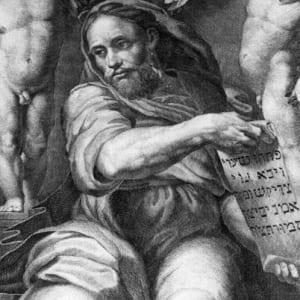 Yet God will preserve a remnant and have them return to Jerusalem after the exile. At the end of the chapter, we have another picture of a resurrected branch emerging from a stump. The immediate reference is to ‘a remnant returning after the captivity’. The far-reaching meaning of the branch emerging from the stump is a reference to the coming of Christ.
Yet God will preserve a remnant and have them return to Jerusalem after the exile. At the end of the chapter, we have another picture of a resurrected branch emerging from a stump. The immediate reference is to ‘a remnant returning after the captivity’. The far-reaching meaning of the branch emerging from the stump is a reference to the coming of Christ.
Isaiah 6:13 13 “Yet there will be a tenth portion in it, and it will again be subject to burning, like a terebinth or an oak Whose stump remains when it is felled. The holy seed is its stump.”
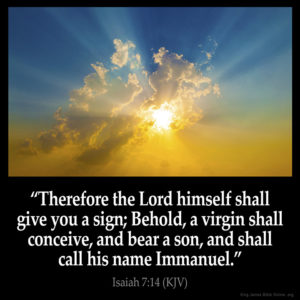 Chapter 7 contains the prophecy of the virgin birth of Christ, but it is also in the context of a more immediate prophecy that takes place during the reign of King Ahaz.
Chapter 7 contains the prophecy of the virgin birth of Christ, but it is also in the context of a more immediate prophecy that takes place during the reign of King Ahaz.
The prophecies in Isaiah are not in chronological order. Jotham comes to the throne after his father, Uzziah, dies, and he reigns for 16 years. He did what was right in the eyes of the Lord (2 Kings 15:32-34). Jotham’s son, Ahaz, succeeds Jotham and will also reign for 16 years. He walks in the idolatrous ways of the Kings of Israel rather than the ways of his father Jotham or grandfather Uzziah (See 2 Kings 16:3-4). He made his son pass through the fire, a pagan rite that might mean child sacrifice.
There is a civil war during his reign between the northern and southern kingdoms, with Syria (King Rezin of Syria) aligning with the north (King Pekah of Israel) against the south (King Ahaz of Judah).
Although Ahaz is evil and does not walk in the ways of the Lord, because of God’s covenant commitment to the house of David, God promises to protect his kingdom from being conquered by the Israel-Syria alliance.
Isaiah is told to meet King Ahaz at the end of the aqueduct of the Upper Pool on the road to the Washerman’s field. He is to bring his son, whose name is ‘Shear-jashub’ meaning ‘a remnant will return’. He is to give Ahaz a promise of God’s protection (7:8), yet also a warning of what will come to pass if he does not stand firm in his faith (7:9).
Isaiah tells King Ahaz to ask for a sign. The King refuses to do so, citing that he did not want to tempt the Lord. But it was the Lord who had given the message to Isaiah. God would give a sign of assurance to King Ahaz anyway.
As we read the prophets, we will notice that there are immediate and local fulfillments of prophecies that validate the authenticity of the prophet’s ministry before their contemporaries. This is how they were to be recognized as a prophet.
Deuteronomy 18:21-22 21 “You may say in your heart, ‘How will we know the word which the LORD has not spoken?’ 22 “When a prophet speaks in the name of the LORD, if the thing does not come about or come true, that is the thing which the LORD has not spoken. The prophet has spoken it presumptuously; you shall not be afraid of him.
But many of the prophecies are for long range fulfillments, beyond the lifetimes of the prophets and their own generations. We can be sure of the accuracy of the future prophecies because of the accurate fulfillment of the immediate and local prophecies.
The sign that Isaiah prophesies to assure King Ahaz that Judah will be spared from the aggressors Rezin and Aram was this:
Isaiah 7:14 14 “Therefore the Lord Himself will give you a sign: Behold, a virgin will be with child and bear a son, and she will call His name Immanuel.
We know this as a prophecy of the virgin birth of Christ and that it is (Matthew 1:23). But it also had a local and immediate purpose to bring assurance of God’s deliverance from the Syrian-Israeli invasion of Judah.
It will be fulfilled with the birth of a child. This was intended to convince Ahaz of the authenticity of the prophecy, assuring them that the alliance of Israel and Syria would not overtake Jerusalem and that God, and not Syria, would establish the throne of David.
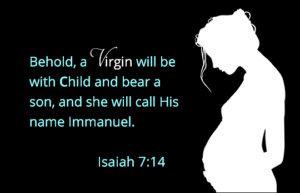 The word for ‘virgin’ here in the Hebrew is ‘almah’ and is used for an unmarried woman. It is believed that the prophecy refers to a young woman from the house of Ahaz who was not married at the time when the prophecy was given. She would subsequently marry and give birth to a child named Immanuel. Therefore, Isaiah was foretelling that before three years had passed (one year for the woman’s pregnancy and two further years for the child to become old enough to talk), the two invading armies would be destroyed.
The word for ‘virgin’ here in the Hebrew is ‘almah’ and is used for an unmarried woman. It is believed that the prophecy refers to a young woman from the house of Ahaz who was not married at the time when the prophecy was given. She would subsequently marry and give birth to a child named Immanuel. Therefore, Isaiah was foretelling that before three years had passed (one year for the woman’s pregnancy and two further years for the child to become old enough to talk), the two invading armies would be destroyed.
Matthew 1:23 assures us that the fulfillment of the prophecy of a more far-reaching deliverance would be in the further future, with the sign of the virgin birth of Jesus Christ.
Matthew 1:23 23 “BEHOLD, THE VIRGIN SHALL BE WITH CHILD AND SHALL BEAR A SON, AND THEY SHALL CALL HIS NAME IMMANUEL,” which translated means, “GOD WITH US.”
TODAY’S READING FROM THE NEW TESTAMENT – 2 CORINTHIANS 11:16-33
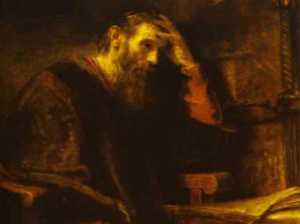 Paul continues the defense of his apostleship in the light of the attacks on his credibility and integrity made by the false teachers.
Paul continues the defense of his apostleship in the light of the attacks on his credibility and integrity made by the false teachers.
He consistently rebukes the Corinthians for their lack of discernment because they give place to false teachers.
2 Corinthians 11:4 4 For if one comes and preaches another Jesus whom we have not preached, or you receive a different spirit which you have not received, or a different gospel which you have not accepted, you bear this beautifully.
2 Corinthians 11:20 20 For you tolerate it if anyone enslaves you, anyone devours you, anyone takes advantage of you, anyone exalts himself, anyone hits you in the face.
He compares his own credentials to that of his own competitors. He may not be a polished speaker, great orator, entertainer, or attractive celebrity charging fees for self-help seminars, but he assures them that he is the real deal. He is a genuine Jew, a descendant of Abraham, and a true servant of Christ.
He is not in the ministry for the money or for recognition. He stands for the truth at a great cost. He lists his sufferings in comparison to the super-apostles:- his harder work, he had more imprisonments, more floggings, more exposures to death, 5 times receiving the maximum legal beatings under Roman law of 39 lashes, 3 times beaten with rods, stoned once, 3 times he was shipwrecked (and there was another shipwreck to come- See Acts 27). He knew both times of hunger and thirst (involuntary fasting) and going without food (voluntary fasting). Among the greatest sufferings listed, he includes, “danger of false brothers”.
His concern for the church is genuine and all-consuming.
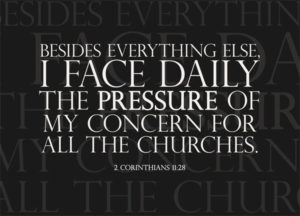 2 Corinthians 11:28 28 Apart from such external things, there is the daily pressure on me of concern for all the churches.
2 Corinthians 11:28 28 Apart from such external things, there is the daily pressure on me of concern for all the churches.
We read about Paul’s brushes with death in Luke’s record written in the Book of Acts (62 AD). In 2 Corinthians, written in 55/56 AD, we get Paul’s account. But keep in mind that Paul writes this letter in Macedonia, sometime after leaving Ephesus (Acts 20:1) and before returning to Corinth (Acts 20:2-3). Paul’s list of sufferings in 2 Corinthians is not exhaustive. He has a major shipwreck and more imprisonments to come.
TODAY’S READING FROM THE BOOK OF PSALMS – PSALM 54:1-7
This is another prayer of David when he is betrayed by Ziphites, who intend to deliver him into the murderous hands of King Saul.
1 Samuel 23:19 19 Then Ziphites came up to Saul at Gibeah, saying, “Is David not hiding with us in the strongholds at Horesh, on the hill of Hachilah, which is on the south of Jeshimon?
As David cries for help, he remembers that GOD IS his help (54:4).
 He requests that God avenge his enemies in verse 5.
He requests that God avenge his enemies in verse 5.
He concludes the Psalm expressing confidence that God will prove Himself to be faithful because His Name is good.
Psalm 54:6 6 Willingly I will sacrifice to You; I will give thanks to Your name, O LORD, for it is good.
Do you have confidence in the goodness of God? Even when you are being betrayed, pursued, and surrounded by enemies?
Psalm 54:7 7 For He has delivered me from all trouble, and my eye has looked with satisfaction upon my enemies.
TODAY’S READING FROM THE BOOK OF PROVERBS – PROVERBS 23:1-3
Proverbs 23:1-3 1 When you sit down to dine with a ruler, consider carefully what is before you, 2 And put a knife to your throat If you are a man of great appetite. 3 Do not desire his delicacies, for it is deceptive food.
The practical advice given in these proverbs is that we should be careful how we conduct ourselves in the presence of our leaders, employers or superiors. It is wise to curb our natural appetites, even our desire for approval, when partaking of their occasional lavish offerings because it may be that they want something from you, are observing you or are bribing you to do something that is not ethical. The expression ‘put a knife to your throat’ means ‘control yourself’ similar to ‘bite your tongue’ or ‘put a lid on it’.
PRAY FOR THE NATIONS – MYANMAR
https://www.youtube.com/watch?v=2aI1yR2eNVs
Myanmar, formerly Burma, has more than 100 ethnic groups and is the largest country in Southeast Asia. The land is mostly covered in forests with a tropical climate and is rich in natural resources such as gems, oil, and natural gas. It shares borders with Bangladesh, India, China, Laos, and Thailand. Over 2,200 Buddhist temples, pagodas, and monasteries (built primarily between the 10th to 14th centuries) are found in the city of Bagan alone, reflecting the immense presence and influence of Buddhism in this country.
The Burmese people have suffered the horrific effects of ongoing warfare since 1942. Formerly a British colony, Myanmar gained its independence in 1948. From 1962 to 2011, it was under the control of a military junta. The military still holds great influence in the government, forcibly repressing popular democratic movements and exploiting the country’s rich natural resources. This has left the nation’s economy in shambles, trapping many in poverty. Additionally, Myanmar suffers the second highest HIV/AIDS rate in southeast Asia, with a reported 54% of adults and 78% of children receiving treatment! The creation and use of illegal drugs is a contributing factor to this epidemic. It has been reported that at least 200,000 households are involved in the production of poppies, the source of illegal opiates. Recently, the largest human exodus since the Vietnam War began as Rohingya Muslims desperately fled what the UN described as “ethnic cleansing at the hands of the military.” The Rohingya have been denied citizenship in Myanmar since 1982 and suffer a long history of conflict with the Burmese militia. Hundreds of thousands have left their homes to seek refuge in areas such as Bangladesh, where their suffering has only continued.
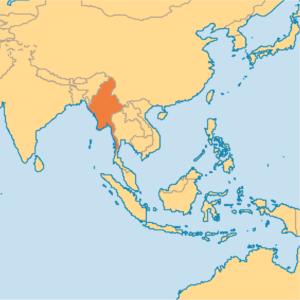 Myanmar is roughly 80% Buddhist, 8% Christian, and 7% Muslim. Approximately 46,000,000 remain unreached with the Gospel, which is 84% of the population! Freedom of religion is restricted, and any group the government considers a threat, including Christians, is harassed, persecuted, and often imprisoned. Buddhism, though no longer considered the state religion, is actively promoted by the military regime. Although the military has attempted to remove Christianity from the nation, the Church continues to grow. Foreign missionaries have been prohibited from working in the nation, but this has not stopped indigenous believers from sharing their faith. It is even estimated that thousands of Buddhist monks have become followers of Jesus!
Myanmar is roughly 80% Buddhist, 8% Christian, and 7% Muslim. Approximately 46,000,000 remain unreached with the Gospel, which is 84% of the population! Freedom of religion is restricted, and any group the government considers a threat, including Christians, is harassed, persecuted, and often imprisoned. Buddhism, though no longer considered the state religion, is actively promoted by the military regime. Although the military has attempted to remove Christianity from the nation, the Church continues to grow. Foreign missionaries have been prohibited from working in the nation, but this has not stopped indigenous believers from sharing their faith. It is even estimated that thousands of Buddhist monks have become followers of Jesus!
PRAYER: Lord, we need a fresh vision of Your holiness. Forgive us for bemoaning temporal situations and for looking to men and women as our help rather than to You. May we never forget that You are reigning on the Throne. Thank You for the cross and the ministry of the Word that applies its benefits to us by the power of Your Spirit. Help us to discern Your concerns. We ask that You would send us as Your ambassadors to bring the message of the cross, the message of reconciliation, the glorious gospel of Jesus Christ to others. You are our help. In Jesus’ Name. Amen.
-Pastor David

